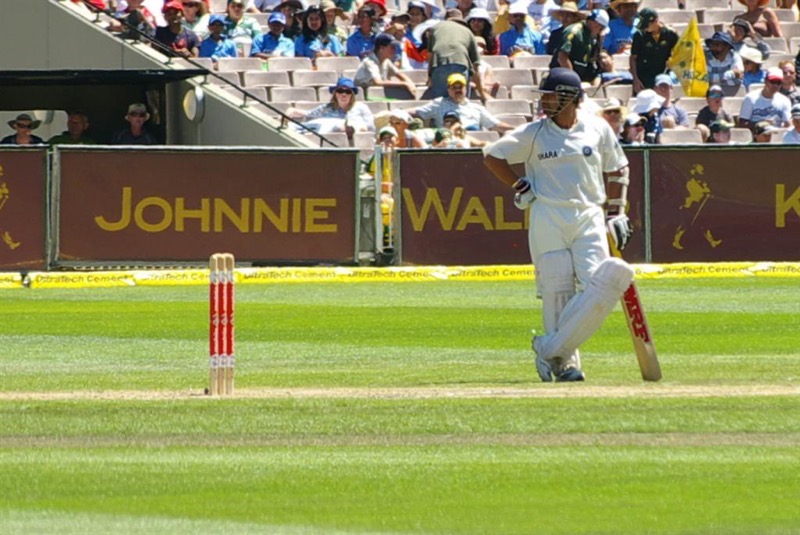Sachin Tendulkar was one of cricket’s greatest ever composers. He brought to the game a new symphony — the music of the spheres. The first lyric for him took place through initiation; the second in execution. It was from there the song and stroke of the willow followed — thanks to his own captivating violin. Finally, Tendulkar brought to his movement a sense of divine whirl — of everything defining a great moment in sport.
For Bharat Ratna — the highest civilian award of the Republic of India — Tendulkar (born, Bombay, now Mumbai, April 24, 1973), the music of the bat was steeped step-by-step into his psyche — so much so, you would begin to think how each movement of his body, eyes, the limbs, arms, and hands, not to speak of the wrists, and fingers, could be set so harmoniously in one individual. This, indeed, is the magic he will always hold for us all.
Tendulkar’s interpretation of batting mechanics was also a depiction of innate charm, or perceived wisdom — something that was so natural you’d think that cricket is so easy, and not what it’s being ‘made out to be.’ But, the fact is: cricket is a difficult vocation, not as easy as the unusual patterns of verbal ‘bullshit’ that is being dished out by way of celebrity-models, or ‘screaming’ reporters — who know cricket ‘less’ and ‘news’ more — and, their weird fixations on TV.
Prose & Poetry
Tendulkar’s amazing cricketing prose was adorned by the dainty rhythms and cadences of poetry. This made him a legend — and, also the indispensable element of Indian cricket. Besides, he seemed to be inspired not merely by human genius, but also by the Delphic oracle. If Cicero had been around, he would have spoken of Tendulkar in a manner he aptly construed to eulogise Plato, “If Jupiter wished to speak with the cricket bat, he would speak only in the language of Tendulkar.” This eulogy, or metaphor, is best left to the incomparable Tony Greig, a truly committed ‘Sacch-chin’ fan, to paraphrase in his heavenly abode, for all the gods to savour and delight.
Tendulkar’s magic was apparent when he played his first international match at age 16, against Pakistan, in that country — not a pleasant prospect for a newcomer. He stood up to the fire of Wasim Akram — one of the finest left-arm fast bowlers that the cricketing world has ever known. Akram, who was talented to the hilt, had a bowling armoury that was every fast bowler’s envy. What’s more, Akram, in addition to his genuine pace, possessed a super-duper degree of control over out-swing and in-swing. The pioneer who mastered the formidable art of reverse swing, Akram sure gave Tendulkar his first litmus test. If this wasn’t enough, Tendulkar had to contend with yet another soon-to-be-a-giant of a paceman, Waqar Younis.
Tendulkar did not flinch; on the contrary, he revealed his class, if not blossoming genius, from the word go. And, for one who was so young — it was like winning the Gold in the Olympic Games. Sure, he may not have set Lahore on song and dance, or scored heavily. But, he followed his baptism of fire, in Pakistan, quite well in new horizons — the Antipodes. The sojourn wasn’t truly remarkable — but, there was a spark in him that was too obvious. Palpable.
He had to wait for England — the Home of Cricket — to unleash his incredible talent. On his first tour of good, old Blighty, Tendulkar emerged. He never looked back.
What made Tendulkar Tendulkar was he seemed to play his best cricket against the best teams. When the challenge was enormous, he rose to the occasion just as much. Maybe, he did not take India, with the bat, to many more Test match and ODI victories away from home, as his talent warranted him to. All the same — that he scored a century in his every fifth, or sixth, outing, on an average, was legendary, although it did not translate the team’s performance into triumphs in like manner. Blame it on the basic ‘swing’ of the team, as one unit, or collective failure — you have a pattern that is unique to Indian cricket. We are up and up, when we are up there; and, we are down and down, when we slide down the ladder of achievement.
A Born Genius
For a born genius, with the bat, Tendulkar may not have emerged a great captain — call it the human element, or what you may. All the same, he more than compensated for it with his regal flair, style, aggression and stunning luminosity. What earned him more than a phenomenal degree of respect and adulation was his down-to-earth simplicity — this despite being an icon like no other. He was more popular than Jawaharlal Nehru, perhaps, ever was — just before India became independent, or soon after the heady days of free India’s first democratic government.
But, let’s not forget the fact that Tendulkar is human — representative of human flaws. For a man who seemed to have the knack to overhaul every record possible, as it were, or set new heights, there was an emerging thought, in certain quarters, that held the view that Tendulkar was playing for his own personal glory — unlike before — and, not for the team per se. This was, and is, incorrect — whatever the argument.
To highlight just one example: when captain Rahul Dravid declared the innings, in a Test in Pakistan, when Sachin was on 194, six short of another double-hundred, the latter went overboard, all right. He’s human, after all. It’s Indian cricket’s good luck that things were sorted out — and, all was hunky-dory, thanks to Sachin’s own understanding of the issue — that the team is supreme — in more temperate contemplation and Dravid’s realism. Well, let’s give Tendulkar the credit too for defusing a difficult situation — but, the reservation remains. Well, that’s life in cricketing lingo.
Tendulkar’s catalogue of cricket records is mind-boggling. To summarise its essence, in just one article, would be tantamount to presenting Mount Everest in a bottle. Impossible. To make a long story short, it’d, perhaps, be best to paraphrase Chris Teale in Bleacher Report, “Tendulkar holds the record for the most runs scored in Test matches — a testament to his longevity and ability in the longest form of cricket. His 15,921 runs (average: 53.78) are more than 2,500 above second-placed Ricky Ponting. It will surely never be (sur)passed.”
He adds, “In a One-Day International career that lasted until 2012, Tendulkar stands above all others as the highest run-scorer in the history of the game. During his 463 ODI appearances — also a world record — Tendulkar scored a superb 18,426 runs, at an average of 44.83.”
This was not all. “Tendulkar scored 51 Test centuries, a world record. His 100 hundreds in all international cricket was the first such milestone ever achieved. He also stands alone as scoring the most centuries among every player to have played ODI cricket. His tally of 49 hundreds is also one that is unlikely to be beaten.”
Atlas Of Cricket
Tendulkar was the atlas of Indian cricket. He still is — with his gentle presence and words of wisdom. He was the ‘ammo’ that provided the team with the psychological muscle and advantage. His charisma was glucose to the side — a matter of honour. When he hit the purple patch, India revelled; when he dunked, India tumbled, as it were. You need not be a statistician to delve into the percentage game.
Tendulkar’s cricket was a brilliant alchemy of quick and delayed kinetic energy as the situation demanded. But, he always believed in pounding the opposition into compliance with glitzy belligerence. Also, he did exceptionally well in all climes — the true greatness of a batsman — albeit on this count Dravid seemed to have a certain edge, as it were, with his much better, and consistent, overseas record. Oops — we are not, in any way, comparing the two legends. No way — it’s not our intention. Tendulkar and Dravid were the two sides of the same coin — and, therefore, fundamental to Indian cricket.
Besides, it’s elementary to say that Tendulkar’s fame is legion. He is, aside from wearing several hats, a theme for a musical album, a subject of textbook syllabus in schools and a movie-like documentary, among other things. No wonder, he carries a magnificent cricketing baggage that kids, or just about anyone, could draw inspiration from — for today and tomorrow.
Tendulkar was the Don Bradman of his age. There won’t be another like him — again.
-30-
Copyright©Madras Courier, All Rights Reserved. You may share using our article tools. Please don't cut articles from madrascourier.com and redistribute by email, post to the web, mobile phone or social media.Please send in your feed back and comments to editor@madrascourier.com











